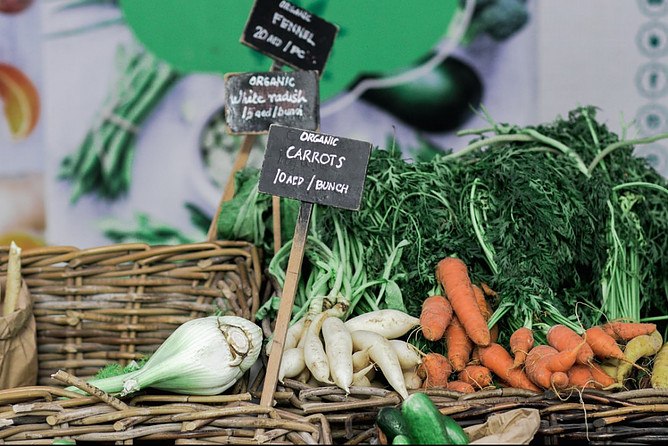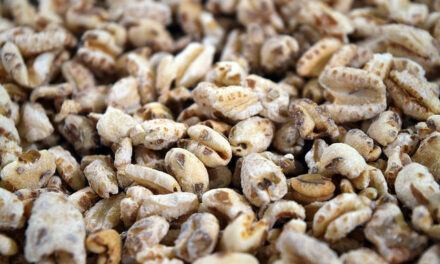‘If you do the grocery shopping for your household, then it’s likely you know about the difference between organic and all-natural products. Maybe even if you don’t do the shopping, most of you may know at least some differences between these product types. Or maybe you just know the name, but don’t know much about it, and that’s fine too.
Either way, it’s likely you’re unaware of what the actual difference is between the two in all aspects, because even if you know about organic and all-natural products, most people don’t know the difference in entirety or the real definition of each one. Lots of people actually mix up the two.
So today, in this article we will discuss organic and all-natural food in its entirity. We will talk about what food has to have in order to be labeled organic or all-natural, what the advantages and disadvantages are of each of the two, and of course, discover what exactly the difference is between them.
So, let’s get started.
What is Organic?
An organic product, or an organic food item, in simple terms, is a product or item that is made or grown without any pesticides or any types of chemicals.
Organic meat, eggs, and dairy products all come from animals who have been raised organically, meaning they’ve been raised outside and are given an organic feed to eat.
This also means they’ve been given absolutely no growth hormone, antibiotic, or animal by-product. They are raised organically, so their product is organic. That’s what organic actually is.
Saying so, some people have their own idea of what organic means, and as you know. For example, people have their own ideas about what food has to have to be called an organic food item or product.
Have you ever thought about what a food item or product actually is required to have, and what rules and regulations have to be met in order to be labeled as an organic food item, according to the Government and the FDA?
Well, let’s discuss that now.
What are the Government Regulations and Requirements for Organic Products?
To be classified and labeled as an organic product, a product must follow strict rules and guidelines and abide by certain requirements. These rules, guidelines, and requirements include the food, items, or products contain 100% organic products to be labeled as 100% organic, as you might’ve guessed, but only need to contain 95% to have the word organic on the label at all.
For the ingredients to be considered organic, it has to comply with a few regulations and requirements as well.
If the product comes from an animal, this means that the animal must have been raised organically, and fed nothing with or was given nothing with growth hormone, antibiotics, or animal-by product. Like I mentioned earlier, their raised organic, so their product is organic.
If the product does not come from an animal, and is instead grown from the earth like a plant or something else, or comes from somewhere else similar to this, along those lines, this just means that it was grown with nothing added to it. That means no chemicals, pesticides, or any other type of substance that could potentially harm the product.
It also cannot be genetically engineered, and you cannot use any other method, remotely relating to that, or those of using chemicals and pesticides, as they are excluded methods of producing these products.

Tip: Although popular among diabetics, if you think BelVita, Protein Drinks, Coffee Creamers, Glucerna are organic. Think again!
Advantage of Organic Food
Besides the fact it contains little to no pesticides, it’s fresher than non-organic foods. The freshness of the food really comes out in the taste, as it tastes better than non-organic food, with there being practically no pesticides or chemicals added to it.
Another advantage of organic food is that it’s overall better for the environment. This also has to do with how there are no pesticides and chemicals.
Not only does the elimination of those two things make the food better, both in the healthiness of the food and products, and in the taste of the food and products, but it also helps the environment, not spreading around pesticides and chemicals in and on our earth, which we only have one of, so we have to take care of it. One way to do that is to buy and support organic food, the farmers and people that make or produce it, and the stores that sell it.
This means you’re not only getting high-quality healthy food, but you’re also helping the environment and the one earth we have in the process. That is probably the biggest and strongest advantage of organic food.
What are the Disadvantages of Organic Food?
Now that we’ve discussed the advantages, let’s talk about the opposite: the disadvantages of organic foods.
Some disadvantages include the fact that because it’s so fresh and there are no chemicals of any sort, it goes bad easily, and although there are no pesticides or chemicals of any sort, it does have a high bacteria level. It may even have a high level because there’s no pesticides or chemicals used on this produce.
Those are the two main disadvantages of organic food. However, the most common complaint about organic food, which almost everyone would consider a disadvantage is how expensive it is.
Though a lot of the time expensive items and products are considered “better quality” and attract more people, it can be stressful for some people, and if you can save money on anything, most people would choose that option. When it comes to organic food, it is true that it’s more expensive because it’s better quality.

Tip: Chinen salt an ‘organic’ salt compared to table salt.
However, most people aren’t happy about spending the extra money. If people could save money on this, just like everything else, they would choose that option. But in this case, there is rarely any situations where you could get these food items and products for cheap. But, the extra money is worth it.
You’ll be eating better while also helping the environment by supporting the stores and the suppliers that are growing and making the item or product that is better for and helping the environment.
By now, we know a lot about Organic. But, then what is ‘All-natural’?
What is All-natural?
All-natural, a bit like organic, has a variety of definitions, depending on who you ask. However, the actual definition of food that is all-natural is food that has not been processed in any way.
Those products or items also contain nothing artificial or synthetic. It has 0% of anything that is considered artificial, synthetic, or fake, and 0% of any substance that if used on the product, could make it one (or all) of these three things as well.
Another way to put this is it is literally all-natural, like the name says, coming completely from nature, with nothing in the product being processed and nothing artificial being added to it after it is grown and/or raised being an all-natural product.
What are the Government Regulations and Requirements for All-natural Products?
This is one thing the Government has not made too many comments on. But, they have made some comments about it, even though they’re not very detailed.
The overall regulations and requirements for all-natural products just state that the product must contain no artificial or synthetic items or products and cannot be processed in any way.
There has been some debate about whether or not products with corn syrup would be considered all-natural, and it looks as though they reached the conclusion that they’re not. So, products with corn syrup are not regarded as all-natural.
Those seem to be the only rules, regulations, and requirements for something to be labeled as all-natural.
What are the Advantages of All-natural?
Just like organic products, all-natural products have many more advantages than disadvantages. These advantages are why people love all-natural food so much. It’s what really makes the product what it is.
Some of these advantages include the
- All-natural food helps control blood sugar,
- they have important nutrients that you can’t get from any type of processed food, and
- they’re low in sugar, but high in fiber, which makes for healthy digestion.
Many people purchase all-natural food to help with their digestion and other stomach issues.
For the majority of people, it works very well, which I guess would be another advantage of these products.
These products make people feel better over-all, and to a lot of people, are even worth some of the disadvantages that come along with it.
Let’s talk about those now.

Tip: Do you think using gemstones to manage stress, anxiety, and depression is an all-natural option?
Disadvantage of All-natural
So, onto the disadvantages, because even though there’s more good than bad when it comes to all-natural products, there are still some things people don’t always like about them, and these things are considered disadvantages of these products.
The first one is, very similarly like organic food, it’s expensive. As it’s higher quality, the price is raised quite a bit on foods and other products and items labeled as natural. But, for most people, it’s worth the price.
Another disadvantage is, even though they’re better for you and help with digestion among other things, it’s possible the all-natural item your purchasing might have some less nutritional items in it. So you may not get everything your body needs only eating all-natural foods and products.
Finally, the last con is that all of these items and products are not available everywhere. They are in most communities, but not all.
So, I suggest visiting any health food store near you, as that’s a place where you’re almost certain to get all-natural items, and if you don’t have one, visit your local grocery store to find out more about all-natural products near you.
Differences Between Organic and All-natural
Although, even with the information I’ve given, some people don’t see the difference between these two types of products, I can assure you that there is at least one. Well, a few actually. Each one has a few things about them that the other does not have. These things are what makes them different from each other.
Let’s discuss some of those now.
The first thing I’d like to point out is the fact that an all-natural product does not need to be composed of organic items, unlike organic products (as pretty obviously shown in the name of these products). An organic product needs to be composed of organic items, or if the product is from an animal, the animal needs to be raised organically.
But, all-natural items do not need to be composed of totally (or mostly) organic items, but this works two ways, as well, as it’s possible that all-natural products can contain things that organic products don’t, as long as it’s not processed.
Those are the basic rules when it comes to organic and all-natural, and I think that right there shows how they are two different things.
Also, organic rules are more strict than all-natural rules when it comes to these products. Organic products have a lot more requirements, that are stricter, and all-natural, although it also has requirements, the requirements are not as strict or hard to comply with. Their rules and requirements a bit looser, and not as complicated or hard to fully achieve making/growing a product that follows all the rules.

Tip: Some essential oils available for diabetic neuropathy pain are organic and all-natural.
Conclusion
In conclusion, all though organic and all-natural products are different in theory, they both have one thing in common. They’re healthier, tastier, and overall better for you.
These products can make you feel much better than most food you can find in your local grocery stores that are processed and contain chemicals and pesticides. These foods can cause you to feel sick and worn out, while organic and all-natural products can make you feel better.
They can make you feel healthier and can potentially give you more energy in the process.
These foods are more expensive and higher up on the market for many reasons, this being the main one.
They can help with many issues you may be facing with your body, and all though they are obviously not medicine or anything like that, these foods can contain mineral, vitamins, supplements, and more that can help you not only raise the levels of these things in your body, but can also help you with things like digestion, energy levels, and more.
Tip: Here are the best supplements for muscle pain and cramps.
Either one of these products would be good to purchase, if you feel that you would benefit from them.
I would recommend going to your local grocery store, or even a specific health food store such as Whole Foods or your local farmers market to see what they have and see if any foods or products with either of these two labels pop out at you.
Thanks for reading! Happy to reply to any questions you may have.









0 Comments